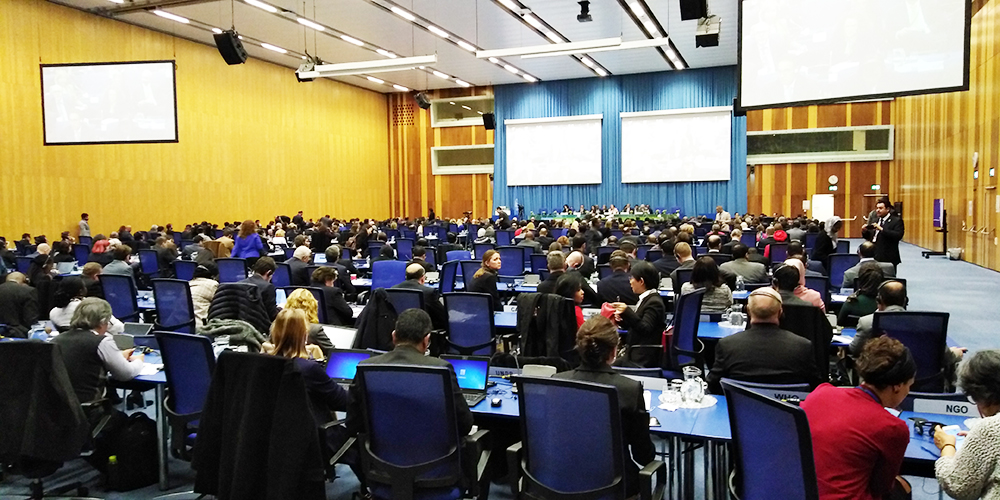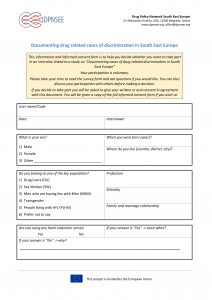After the two-day Ministerial segment held last week, the Regular segment of the UN Committee for Narcotic Drugs (CND) started on Monday 18 March in Vienna. Several representatives of member organisations and DPNSEE participate in the 62nd CND Session.
The Plenary sessions were dealing with business as usual of the CND and UNODC: Strategic management, budgetary and administrative questions and Implementation of the international drug control treaties.
Side events are of specific interest because they present activities, project, policies, approaches and other results from a variety of stakeholders. Here is a review of a few of them in which we participated today.
Scaling the UNODC-Lions Clubs International Foundation global partnership for school-based prevention
 This international programme, implemented in cooperation between UNODC and the International Association of Lions Clubs in the region, seems like recycling the results of the project in previous years. It is a Social and Emotional Learning Program promoting Connection to school, Positive behaviour, Character education, Anti-bullying, Drug, alcohol, and tobacco awareness and Service-learning. The programme included training for a large number of teachers. The project started in South East Europe, first in Serbia, then in Montenegro and North Macedonia and then in Bosnia Herzegovina and El Salvador. Now, preparations are at the end to start it in Croatia, Guatemala and Ivory Coast. More about the programme is available at www.lions-quest.org.
This international programme, implemented in cooperation between UNODC and the International Association of Lions Clubs in the region, seems like recycling the results of the project in previous years. It is a Social and Emotional Learning Program promoting Connection to school, Positive behaviour, Character education, Anti-bullying, Drug, alcohol, and tobacco awareness and Service-learning. The programme included training for a large number of teachers. The project started in South East Europe, first in Serbia, then in Montenegro and North Macedonia and then in Bosnia Herzegovina and El Salvador. Now, preparations are at the end to start it in Croatia, Guatemala and Ivory Coast. More about the programme is available at www.lions-quest.org.
Addressing stigma: Continuing the discussion
 Organized by the Governments of Canada, Estonia, Norway and Uruguay, the United Nations Office on Drugs and Crime, Prevention, Treatment and Rehabilitation Section and the Civil Society Task Force. Good example of three-times expanding the health care for drug users in Uruguay was presented. Three Whitepapers QuitStigmaNow in Health Services, Workplace and Media prepared by Dianova International were also presented and are worth reading. Dr Gilberto Gerra, Chief of Health at UNODC stated that ‘Evidence suggests that incarceration because of drug related offenses is associated w low socio-economic status. This can result in more stigma & discrimination making them more vulnerable.’
Organized by the Governments of Canada, Estonia, Norway and Uruguay, the United Nations Office on Drugs and Crime, Prevention, Treatment and Rehabilitation Section and the Civil Society Task Force. Good example of three-times expanding the health care for drug users in Uruguay was presented. Three Whitepapers QuitStigmaNow in Health Services, Workplace and Media prepared by Dianova International were also presented and are worth reading. Dr Gilberto Gerra, Chief of Health at UNODC stated that ‘Evidence suggests that incarceration because of drug related offenses is associated w low socio-economic status. This can result in more stigma & discrimination making them more vulnerable.’
Strengthening equity in health and resilience: Taking into account the social determinants and risk factors for non-medical use of drugs and criminality
 Organised by governments of Portugal and Sweden and UNODC. The Portuguese representative simply explained that their approach is based on two principles: humanism and pragmatism. In Sweden, they have the Strategy on Alcohol, Narcotics, Doping and Tobacco. Health is in all the policies. The highest prevalence of drug use is in groups with lowest education, especially women. UNODC presented data about strong connection between poverty and drug dependence.
Organised by governments of Portugal and Sweden and UNODC. The Portuguese representative simply explained that their approach is based on two principles: humanism and pragmatism. In Sweden, they have the Strategy on Alcohol, Narcotics, Doping and Tobacco. Health is in all the policies. The highest prevalence of drug use is in groups with lowest education, especially women. UNODC presented data about strong connection between poverty and drug dependence.
***
An incident
During the Ministerial segment, a group of NGO activists protested in front of the Philippines exhibition. NGO’s were warned to abstain from protesting. Today, we were all invited to make a Vienna NGO group photo. Some used the opportunity to hold posters of their friends who were prevented to participate, because of being arrested or killed. The security of the Vienna International Centre estimated this as an act of demonstration, one which NGOs are doing even if they are warned not to do it, took away the posters, forced people to take of shirts with messages (mainly of the campaign Support. Don’t Punish) and informed us that they will propose that NGO participants will be kicked out of the event.




 Drug testing, performed by Association Drogart, is open, but in smaller scale as before and with more safety measures.
Drug testing, performed by Association Drogart, is open, but in smaller scale as before and with more safety measures.

 Aim of the
Aim of the 
 In 2018 the Commission on Narcotic Drugs adopted Resolution 61/11 ‘Promoting non-stigmatizing attitudes to ensure the availability of, access to and delivery of health, care and social services for drug users’. With the support of the Government of Canada, the
In 2018 the Commission on Narcotic Drugs adopted Resolution 61/11 ‘Promoting non-stigmatizing attitudes to ensure the availability of, access to and delivery of health, care and social services for drug users’. With the support of the Government of Canada, the 







